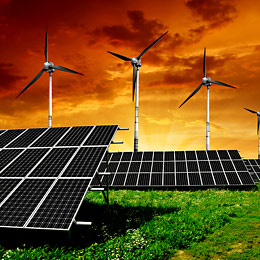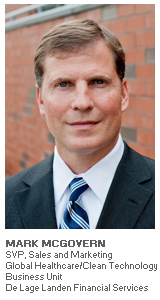
Mark McGovern, SVP, Sales and Marketing of the Healthcare/Clean Technology Group of De Lage Landen met with Equipment Finance Advisor to share his thoughts on the evolving clean technology segment and how clean technology means more than just solar and wind financing at DLL.
According to a May 2013 report from NPD Solarbuzz, a solar industry website and industry research company, the U.S. market is anticipating the installation of approximately 4.3GW in 2013, representing roughly a 20% increase over 2012 installation levels. This increase is being driven primarily by utility-scale projects, and the research firm expects PV installations to possibly surpass 5GW in 2014.
However, the report also issued a cautious outlook for continued long-term growth in the U.S. market due to the strong dependence on PV demand regionally rather than on a national scale. According to this report, nine states will account for more 85% of all U.S. solar PV demand in 2013.
Fundamentally, most research shows global market demand for clean technology remains strong and many of the pieces are in place to keep this market growing. Increasingly lower prices for clean-tech products and services are helping wind and solar power reach “cost parity” in both utility-scale and distributed markets, making the financing of clean technology equipment even more attractive for commercial finance companies and banks.

A critical key to success for the commercial finance companies and banks seeking to take a piece of the clean technology pie is being agile in the face of a rapidly evolving industry and politically charged landscape. Additionally, a deep understanding of the clean technology industry, establishing relationships with the many players involved in these complex transactions, and the ability to efficiently process these deals are critical elements to defining success in this highly-competitive commercial finance segment.
In the following Q & A, Mark McGovern explains how the De Lage Landen (DLL) Clean Technology Group has evolved since its launch roughly five years ago and what he believes it takes to succeed in this specialized equipment finance sector.
Equipment Finance Advisor: In terms of the two major asset-classes in clean energy technology, what is your view of the growth potential for the solar and wind industries?
Mark McGovern: As an asset class, the growth potential in solar continues to be tremendous. As most in our industry know, the cost of solar panels remains a large component of any solar solution. The cost of those panels has been going down significantly over the past two years. However, the balance of system components and all of the other efforts that go into a solar system implementation – design, engineering, installation, and various support services are costs that remain in the mix. The total solution may cost less now, but the ultimate cost of a solar project is not solely driven by panel prices. Solar continues to be a very big part of what we do in the clean technology sector in the U.S.
As for wind, we remain very interested, but the majority of wind deals tend to be more in the scope of our parent, Rabobank, involving numerous large-scale wind turbines, creating farms, either on or off-shore.
We had hoped to see a maturity come into the small wind marketplace (< 100kW) in both rural and urban settings. We’ve seen some very interesting new technologies – unfortunately, these less expensive solutions are produced by less mature manufacturers that typically are not yet able to provide extensive historical data on energy output. Therefore, the certainty of some of the components used in common ROI analysis is less known. We see that this data weakness could pose financial, credit, and asset management risk. For example, being able to review wind study output data in excess of 18 months is worthwhile to assess the viability of a project and its ability to generate sufficient output to ensure the repayment of any financing.
Our preference is to finance large-scale turbines in small clusters – meaning one, two or three turbines often serving a community where we have the benefit of technology maturity tied to more established manufacturers, a relevant wind study, and a deal size that fits well for DLL.
EF Advisor: How has DLL expanded the definition of clean technology over the past two years?
McGovern: Outside of solar and wind, we are deeply involved in the financing of lighting. We have been financing lighting retrofits for over four years now, and we’ve seen a lot of activity. We believe the lighting retrofit industry, which has been driven by the acceptance of LED technology as the industry standard, will continue to grow significantly. The payback for these solutions as compared to solar is significantly shorter – with paybacks less than four years and in some cases, less than three years. This strategy has also led us into the financing of other assets within the building shell, such as controls and high-efficient heating and cooling systems. We are expanding our focus on financing energy efficient lighting to include more types of energy efficient equipment.
EF Advisor: Does this mean DLL is developing programs with manufacturers, distributors and installers of energy efficient cooling and heating systems – thereby providing turnkey building efficiency financing solution?
McGovern: Yes, we’ve seen some manufacturers and energy solution providers that will straddle both solar and lighting or lighting and other forms of efficiency. Typically these projects will consist of relatively mature technologies that can be sold in combination. However, it’s not quite at the point where they are financed holistically. Ultimately they become separate schedules or deals. That host or end customer is collecting the benefit of a comprehensive efficiency solution via financing.
EF Advisor: Is DLL still investigating the Biomass and Geothermal markets?
McGovern: Geothermal and Biomass are of interest to DLL. We have participated in some transactions, but they aren’t a lead focus at this time. However, we have moved into financing of water technology – the purification of water for consumption and use in a variety of industrial / commercial applications. The repurposing and purification of water is something we are actively pursuing because it fits well with DLL’s sustainability ambitions.
At DLL, a sustainable approach to doing business is embedded in our culture. In the end, we are going to offer and explore financing options that deliver benefits for our partners, their customers, and the environment.
EF Advisor: When we last spoke in 2011, you mentioned the challenges in fitting clean technology financing into a vendor model – most particularly solar financing. Can the clean technology industry which often requires project financing actually fit within a vendor model?
McGovern: We’ve been attempting to bring these highly-structured deals down market to make them a bit more efficient and standardized – to streamline and “vendorize” them if you will. We believe that we are on that path as I said 18 months ago. We continue to see the manufacturers of panels desiring to have more control at the point of sale. But it’s still a complicated sale as you have installers, engineering and construction firms, and developers who are ultimately closing the sale with the end customer. What continues to make that offer compelling is the concept of zero up-front investment, matched to an immediate reduction to the price of energy. This is accomplished through monetizing incentives, access to tax based pricing, the inherent cost of power, as well as the size and output of the project. So these remain complicated project finance transactions, which continue to be the preferred way to drive the adoption of this technology. As the market and the participants continue to mature and equipment costs begin to flatten out, so will the ability to get closer to a vendor model.
EF Advisor: Is partnering with manufacturers and distributors a focus for DLL within the solar sector?
McGovern: Yes. We’ve been active in partnering with manufacturers, and we see them moving more deeply into the distribution process. Some of them are adopting development arms and others are active building more robust distribution networks.
EF Advisor: How significantly has the decline in PV values impacted the asset management and credit underwriting process in relation to solar transactions within the solar finance industry?
McGovern: We’ve seen massive changes. As you noted, there have been large decreases in the prices of panels. As a result, many manufacturers are experiencing financial distress and some a have exited the business altogether. This leads to instability in the marketplace, a need to analyze warranty confidence, and a heightened focus on manufacturing processes and quality assurance.
Therefore, it is incumbent upon us to protect our assets and we do so via extensive due diligence. Our asset management focus is more intense than it was two years ago. Additionally, assessing the strength and stability of the manufacturer, including its ability to stand behind its warranty is critical.
EF Advisor: Tax incentives and subsidy programs have changed and are heavily impacted by state and region. Have the changes in these programs and tax incentives made it harder to conduct business in solar?
McGovern: The Treasury Cash Grant was very meaningful and certainly instrumental in accelerating the adoption of the technology. It also made it easier to play a role in the development of projects. The state and/or local subsidies and incentives play a meaningful, if not significant, role in whether the solution “pencils” for the end customer – meaning is the proposed project ultimately attractive or not. We have seen these subsidies migrating to various states, counties and communities. Partnering with mature developers that have expertise in these incentive schemes is critical. As I said 18 months ago, we still anticipate normalized financing to emerge here, but it’s not next week or next month or even next year. But we continue on this path.
EF Advisor: What are your thoughts for the rest of 2013 and into the future for the DLL Clean Technology Group?
McGovern: We expect to see strong growth in the sector. In reference to the clean tech industry, and its potential for growth compared to traditional asset finance sectors, the growth potential of clean technology dwarfs them. We are ultimately drawn to the sector because we believe in the promotion of sustainability. This is a core belief across all of DLL’s business segments. So it has been a very natural extension to provide financing for projects which promote energy efficiency, the use of alternative energy and reduce our carbon footprint. I see meaningful growth for our clean technology group in 2013 and beyond … and we are well positioned for this growth and the continued diversification of our activities.
Mark McGovern is the SVP, Sales and Marketing of the Healthcare/Clean Technology Group of De Lage Landen, which provides equipment financing to the healthcare, renewable energy and energy efficiency sectors. His responsibilities include management, strategy and continued expansion of the Healthcare/Clean Technology Group on a global basis. For the third year in a row, De Lage Landen was recognized as the “Green Lessor of the Year” by Leasing Life, an award that honors the lessor deemed to have made the biggest inroads into green technology finance, while also cutting the environmental impact of its own day-to-day operations.